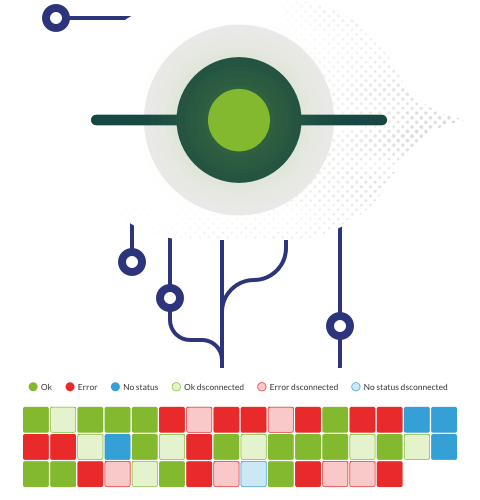Company Computers; Considerations before buying these products
Do you have to choose company computers? What if, instead of one, you have to buy 100? Or even 1000!
Computers are a fundamental asset for any company. If the company computers are not right, it can affect the productivity of your workers and cause multiple incidents with economic repercussions. For this reason, it is necessary to choose well the device that is going to be acquired and, of course, to control that they work in the appropriate way (later on we will talk a little about monitoring).
However, there are so many options on the market, so many different brands, so many different device configurations that it is not easy to decide. Do you need tips to make a better choice? Let’s go get ’em.
5 important issues when buying company computers
– Cheap can be expensive
Are you one of those who lick yoghurt lids so as not to waste even the slightest? When you buy ham, do you ask to have it sliced finely to make it last longer? So do you plan to do something similar with computers for your company? My friend, saving is good, but saving is not always what you might think.
It’s just that buying inexpensive computers may not be a very good idea. Keep in mind that the use of company computers often affects productivity and, if they are too cheap (for example because you buy old and second-hand computers), productivity is likely to suffer.
You want to do some math to make it clearer? Imagine that a computer that is too old and too slow causes each of your workers to lose, roughly, 1 minute an hour. Imagine now that you value each hour of work at 25 euros. If we divide 25 euros between 60 minutes that make up an hour, the result is that, every hour, you would lose 0.42 euros because of the slowness of each of your old computers. Do you think that’s too little? Let’s move on.
0.42 euros for 8 hours of work, resulting in 3.36 euros per day. Multiplied by 230 working days per year we get the beautiful figure of… 772.8 euros per year!
Although these are thick stroke calculations, what we want to explain is that the choice of the cheapest options can be expensive when it comes to choosing working material. But let’s not dwell on this any longer, for it’s been made clear enough. Let’s get on with it!
– How many devices do you need?
It is another essential question, which will not always have an easy answer. How many computers does my company need? And another question: what budget do I have?
We imagine that, by now, you’ve already thought about drawing up a list of the number of pieces of devices you need, their characteristics and the budget available to you. Haven’t you done it yet? Did you think you’d write it all down on the back of your hand? Oh, my God… Please keep reading…
– What type of device is right for me?
The answer to this question will depend on the needs of your business. You must bear in mind that the use that is going to be given to each computer in the company will imply different characteristics. It has nothing to do with using a computer for basic office automation than doing it for graphic design, and specially if it is about, for example, acquiring servers…
The use given to the device will determine many things: model, design, hard disk, power, durability, screen size… That’s why, before buying devices, it would be good for you to define in detail in your list what each device will be dedicated to and what will be the technical characteristics that each one of them will have to comply with.
– Laptop or desktop?
Dad or mom? Mountain or beach? Laptop or table? Within the definition of what use will be given to each device, do not forget to ask yourself this question.
Will your computers need mobility or will they always be fixed in the same place? If they’re not going to move, it looks like the desktop option would be better (they’re usually cheaper and more powerful); however, if they’re going to be taken out of the workplace or if they’re going to be moved around in the workplace, laptops may be a good option.
Even a mixed choice may be best: a portable part and a desktop part. Whatever your needs, don’t forget to ask yourself!
– Which operating system do I choose?
Although it is not a written rule, it is normal that, when you buy company computers, you make sure that everyone has the same operating system. Windows? Mac? Linux? All of them offer advantages and disadvantages, but try not to turn your company into a jungle in which 37 different operating systems live together…
So far we’ve seen some factors you should think about before buying company computers. However, there is one other thing you should keep in mind once you have acquired them, and that is the importance of good monitoring software.
Good monitoring can be essential for aspects such as improving the company’s hardware utilization. For example, if a piece of equipment is not working properly, the monitoring system will detect it, notify you of this, so you can make a determination to repair or replace it.
But not only that. Good monitoring software can bring benefits at many different levels. If you want to know more, you can have a look at this article in which we talked about the importance of having a good monitoring system.
Now, let’s get to know Pandora FMS.
Since Pandora FMS is a flexible monitoring software, capable of monitoring devices, infrastructures, applications, services and business processes.
You want to get to know it better? Click here: https://pandorafms.com/
Do you have any questions? You can send us any query you may have about Pandora FMS in a very simple way, thanks to the contact form that can be found in the following address: https://pandorafms.com/contact/
Our Pandora FMS team will be happy to assist you!
Pandora FMS’s editorial team is made up of a group of writers and IT professionals with one thing in common: their passion for computer system monitoring. Pandora FMS’s editorial team is made up of a group of writers and IT professionals with one thing in common: their passion for computer system monitoring.

















